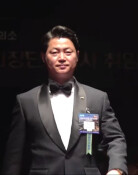New chief of staff should fill vacuum in state administration
New chief of staff should fill vacuum in state administration
Posted August. 06, 2013 00:18,
President Park Geun-hye conducted a surprise personnel reshuffle of her office by appointing her chief of staff and four senior presidential secretaries on Monday. It is quite unusual that the presidential office has replaced senior presidential aides en masse in about five months after the inauguration of a new administration. President Park took the measure of personnel reform as soon as she returned from her summer vacation apparently in a show of her commitment to reinvigorate anew administration of state affairs.
It is true that former Presidential Chief of Staff Huh Tae-yeol was expected to face premature termination of his appointment because he failed to play his due roles as the head of the presidential human resources team and to win the presidents confidence. It is fair to say that the latest personnel reshuffle conveys the presidents request to her secretarial team to faithfully accomplish its role as the central command in state administration.
Kim Ki-choon, who has been appointed as the new presidential chief of staff, was a member of the Seven People Club, Parks advisory senior group during last years presidential campaign. Although he enjoys Parks strong confidence, he is a man of older generation who is at an advanced age of 74, and built a successful career during Park Chung-hee, Roh Tae-woo and Kim Young-sam administrations. He was also once indicted for his involvement in the Chowon Blowfish Restaurant scandal, in which he assembled heads of state organizations in the Busan region, while serving as justice minister in December 1992. Well versed with the three branches of the government, he might be capable in running the presidential office efficiently due to his deep understanding of President Parks intentions, but he hardly gives the public the image of a fresh figure.
It was also an unexpected shift that the president appointed Park Joon-woo, former career diplomat who served as the Korean Ambassador to the European Union, as senior presidential secretary for political affairs. He may be talented as a diplomat, but politics and diplomacy are different arenas. A presidential secretary for political affairs should be able to successfully communicate with the opposition parties and have political capacity to make under-the-table contacts with the leadership of the ruling party. It is almost like a test for President Park to appoint a non-politician who has never even served as lawmaker to such a post. Frankly speaking, it is more worrisome than hopeful that Park as new senior presidential secretary for political affairs will properly carry out the necessary roles.
Thus far, President Parks personnel management has been highly controversial as is evidenced by critical expressions such as personnel management based on her diary, and belated appointment of posts. When it comes to personnel management, just as important as appointing right persons who are qualified and capable to right positions is appointing personnel at right times. Because the heads of a number of state-run organizations, including Korea Hydro-Nuclear Power Co., have yet to be appointed, many of the organizations are not carrying out their mandate adequately. Since the presidential chief of staff who doubles as the head of the presidential personnel affairs team has been newly appointed, the presidential office should seek human resources from a broad base and speedily fill vacant posts after conducting strict evaluations of candidates.
President Park has been criticized as president who stays away from politics thus far, and her cherished projects including future strategy and creative economy have yet to generate notable achievements. Presidential aides have important roles to play, but the most important is the presidents own commitment. In the wake of the personnel reshuffle, President Park is urged to take a more proactive role to resolve the pending political impasse and to inject fresh momentum into government affairs.
Headline News
- Kim Jong Un: Negotiations with U.S. have gone to the limit
- Yoon’s support rating remains at 20% for two weeks in a row
- SEC chair known for cryptocurrency regulations announces resignation
- Medical student scores 398 on CSAT, signaling ‘applications for reach schools’
- Noh Kyung-eun to play up to three more years with SSG







